|
|
 |
Fiche d'espèce de Copépode |
|
|
Siphonostomatoida ( Ordre ) |
|
|
|
Pontoeciellidae ( Famille ) |
|
|
|
Pontoeciella ( Genre ) |
|
|
| |
Pontoeciella abyssicola (T. Scott, 1894) (F,M) | |
| | | | | | | Syn.: | Artotrogus abyssicolus T. Scott, 1894 b (p.128, figs.F,M);
Ratania sp. : Rose, 1939 (p.24, Descr.F, figs.F, no M);
Carnegiella gracilis Wilson, 1942 a (p.176, figs.F = M);
Danodes plumata Wilson, 1942 a (p.182, figs.F); Minoda, 1971 (p.47, Rem.F);
Danodes panikkari Ummerkutty, 1968 a (p.298, figs.F) | | | | Ref.: | | | Giesbrecht, 1899 (p.20, 83, 105, figs.F); Farran, 1926 (p.296); 1936 a (p.125, figs.F,M); Sewell, 1948 (p.398, Rem.); Saraswathy, 1966 (1967) (p.89, Rem.); Heron & Damkaer, 1969 (p.22, figs.F); Bourcier & al., 1969 (p.272); Boxshall, 1979 (p.242, figs.F,M, Rem.); Saraswathy, 1982 (p.635, Rem.F,M, chart); Huys & Boxshall, 1991 (p.444, 466, figs.F); Boxshall & Huys, 1998 (p.773, figs.F,M); Lapernat, 1999 (p.39, figs.F); Boxshall & Halsey, 2004 (p.811, p.812: figs.F,M); Vives & Shmeleva, 2010 (p.406, figs.F,M, Rem.) | 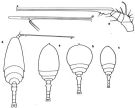 issued from : G.P. Farran in Great Barrier Reef Expedition 1928-29. Scientific Reports, V, No.3. Copepoda. 1936 [p.125, Fig.24]. Female: a, habitus (dorsal); b, idem (specimen from another station); c, idem. Nota: These specimens support the view held by Giesbrecht that this species shows great variation in the relative width of the cephalothorax. The variation also extends in small details of the form of the appendages. Male: d, habitus (dorsal); e, A1. Nota: Siphon absent. A1 apparently 6-segmented. A2 reduced as compared with those of the female. No traces of Md or Mx1. Mx2 and Mxp are of the same form as in female, but weaker and more slender. P5 consists of a single seta.. Urosome 5-segmented.
|
 issued from : M. Rose in Bull. Soc. zool. Fr., 1939, LXIV. [p.25]. Female (Bay of Alger): habitus (dorsal); A1, antennule; A2, antenna; Abd, urosome (dorsal). Nota: A1 8-segmented
|
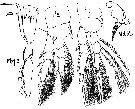 issued from : M. Rose in Bull. Soc. zool. Fr., 1939, LXIV. [p.26,]. Female: Mxp 1 ( = maxilla = Mx2); Mxp 2 (= maxilliped = Mxp); Md Mx, mandible and maxillule; swimming legs P2 and P3. Nota: Md and Mx1 appendices are heavily modified. It a kind of pointed tube from the joining of mandibles and in which a musculature powerful moves maxilla that appear to transformed into stylets.
|
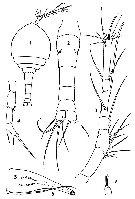 issued from : A.N.P. Ummerkutty in Crustaceana, 1968, 15 (3). [p.299, Figs.1-7]. As Danodes panikkari. Female (from off Karwar, W coast of India): 1, habitus (dorsal); 2, urosome (enlarged); 3, A1; 4, A2; 5, siphon; 6, Md; 7, Mx1.
|
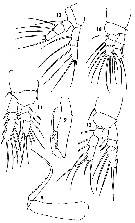 issued from : A.N.P. Ummerkutty in Crustaceana, 1968, 15 (3). [p.301, Figs.8-13]. As Danodes panikkari. Female: 8, Mx2; 9, Mxp; 10, P1; 11, P2; 12, P3, 13, P4.
|
 issued from : A.N.P. Ummerkutty in Crustaceana, 1968, 15 (3). [p.302, Table I]. As Danodes. Differences between Danodes (= Pontoeciella) plumata and Danodes ( = Pontoeciella) panikkari.
|
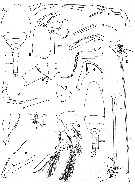 issued from : G.A. Boxshall in Bull. Br. Mus. nat. Hist. (Zool.), 1979, 35 (3). [p.241, Fig.18]. Female (from Gulf of Guinea): A, habitus (dorsal); B, cephalosome (lateral); C, A1; D, A2; E, Md; F, Mx1; G, Mx2; H, Mxp. Male: I, habitus (dorsal); J, anterior portion of urosome (lateral); K, A1; L, A1 (from other specimen); M, A2; N, 3rd and 4th thoracic segments (lateral); O, Mx2; P, Mxp; Q, P1; R, P5 and P6. Scales 0.1 mm unless otherwise indicated.
|
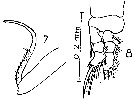 issued from : M. Saraswathy in Proc. Symp. Crustacea. - Symp. Ser. mar. biol. Ass. India, 1966 2 (1). [p.88, Fig.2 (7-8)]. Female (from Trivandrum coast, SW India): 7, Mx2; 8, P1. Nota: The description given by T. Scott (1894) applies to the present specimens except: the terminal segment of Mx2 has 1 spine and the proximal segment of the endopod of P1 carries 1 inner seta.
|
 issued from : G.A. Heron & D.M. Damkaer in Smiths. Contr. Zool., 1969, 20. [p.22, Fig.27]. Female: Mx1. Scale double bars: 0.010 mm.
|
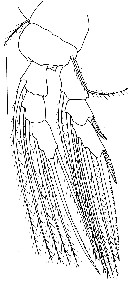 issued from : G.A. Heron & D.M. Damkaer in Smiths. Contr. Zool., 1969, 20. [p.23, Fig.28]. Female: P4. Scale bar: 0.100 mm.
|
 issued from : P.E. Lapernat & C. Razouls in Vie Milieu, 2002, 52 (1). [p.27, Pl. V, fig.1 a, b]. Female (from off Malta, Mediterranean Sea): 1a, Mxp; 1b, Mx2.
| | | | | Ref. compl.: | | | V.N. Greze, 1963 a (tabl.2); De Decker & Mombeck, 1964 (p.13); Shmeleva, 1964 a (p.1068); Delalo, 1968 (p.139); Soenen, 1969 (p.122,180); Gamulin, 1971 (p.382, tab.3); Apostolopoulou, 1972 (p.329, 377); Bainbridge, 1972 (p.61, Appendix Table I: vertical distribution vs day/night); Deevey & Brooks, 1977 (p.156, tab.2, Station "S"); Kovalev & Shmeleva, 1982 (p.86); Scotto di Carlo & al., 1984 (p.1043); Guangshan & Honglin, 1984 (p.118, tab.); Greze & al., 1985 (p.8); Shih & Young, 1995 (p.75); Böttger-Schnack, 1995 (p.93); 1996 (p.1088); 1997 (p.410); Hure & Krsinic, 1998 (p.80, 103); Suarez-Morales & Gasca, 1998 a (p.114); Lapernat & Razouls, 2001 (tab.1); Lan & al., 2004 (p.332, tab.1); Isari & al., 2006 (p.241, tab.II); Hidalgo & al., 2010 (p.2089, Table 2); Mazzocchi & Di Capua, 2010 (p.430); Hsiao S.H. & al., 2011 (p.475, Appendix I); Tutasi & al., 2011 (p.791, Table 2, abundance distribution vs La Niña event); Uysal & Shmeleva, 2012 (p.909, Table I); Belmonte, 2018 (p.273, Table I: Italian zones) | | | | NZ: | 13 | | |
|
Carte de distribution de Pontoeciella abyssicola par zones géographiques
|
| | | | | | | | | | | |  issued from : M. Saraswathy in J. Plankton Res., 1982, 4 (3). [p.634, Fig.1]. issued from : M. Saraswathy in J. Plankton Res., 1982, 4 (3). [p.634, Fig.1].
Distribution of P. abyssicola in the Indian Ocean.
Nota: Samples obtained from the upper 200m water colum at different season. |
 issued from : G.A. Heron & D.M. Damkaer in Smiths. Contr. Zool., 1969, 20. [p.22]. issued from : G.A. Heron & D.M. Damkaer in Smiths. Contr. Zool., 1969, 20. [p.22].
Records indicate a wide distribution and a variable length in female. |
| | | | Loc: | | | South Africa (E), G. of Guinea, G. of Mexico, off Bermuda: Station ‘’ S’’ (32°10’N, 64°30’W), Sargasso Sea, Bay of Biscay, Medit. (Alboran Sea, Algiers, Marseille, Ligurian Sea, Tyrrhenian Sea, off Malta, S Adriatic Sea, Ionian Sea, Aegean Sea, Lebanon Basin), Red Sea, Arabian Sea, W India, Indian Ocean, China Seas (East China Sea, South China Sea), Taiwan (E & NW), Pacif. (W equatorial), Australia (Great Barrier), Samoa Is., Pacif. (E tropical), Baja California, G. of Alaska, Galapagos-Ecuador, Chile (N-S) | | | | N: | 39 | | | | Lg.: | | | (34) F: 0,93- 0,7; (38) F: 1,15; (57) F: 1,1; (138) F: 1,65-0,7; (208) F: 1,49; (340) F: 1; (446) F: 1,45-1,25; M: 1,25; (530) F: 1; (676) F: 1,65; (716) F: 1,17-0,9; (717) F: 1,3; (793) F: 1,1-0,9; M: 0,9; {F: 0,70-1,65; M: 0,90-1,25} | | | | Rem.: | epi-méso-bathypélagique; (off Malte: 2000 m).
Cette espèce pourrait être une forme relicte de la Tethys.
Voir aussi les remarques en anglais | | | Dernière mise à jour : 09/12/2020 | |
|
|
 Toute utilisation de ce site pour une publication sera mentionnée avec la référence suivante : Toute utilisation de ce site pour une publication sera mentionnée avec la référence suivante :
Razouls C., Desreumaux N., Kouwenberg J. et de Bovée F., 2005-2025. - Biodiversité des Copépodes planctoniques marins (morphologie, répartition géographique et données biologiques). Sorbonne Université, CNRS. Disponible sur http://copepodes.obs-banyuls.fr [Accédé le 03 juillet 2025] © copyright 2005-2025 Sorbonne Université, CNRS
|
|
 |
 |















